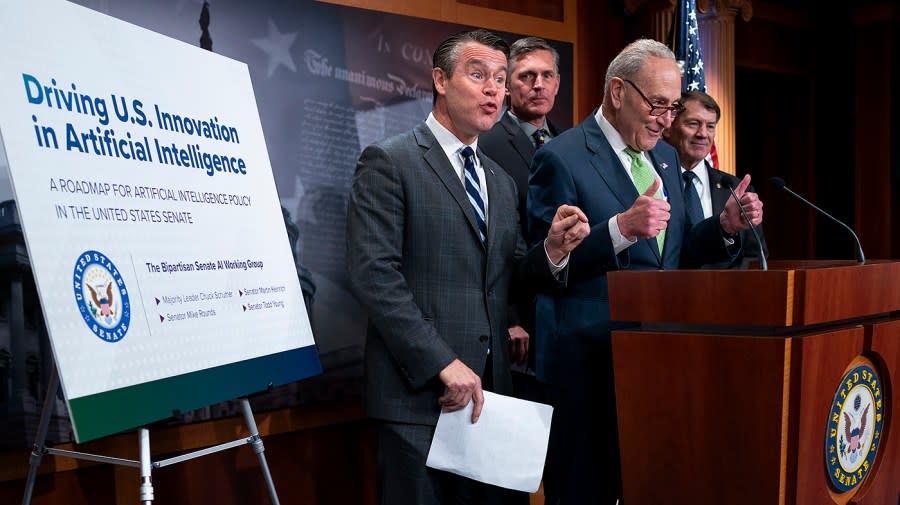Advocates warn Schumer’s AI ‘roadmap’ doesn’t go far enough

- Oops!Something went wrong.Please try again later.
Civil rights, technology and labor advocates are warning that the bipartisan artificial intelligence (AI) guidance Senate Majority Leader Chuck Schumer (D-N.Y.) released Wednesday is not adequate to address the risks posed by the advancing technology.
The guidance released by Schumer’s bipartisan working group encourages committee work to address threats of AI and recommends new funding to boost domestic innovation of AI.
But groups that have been calling for Congress to quickly regulate AI said the guidance doesn’t do enough to address the incoming threats as the industry speeds ahead with advancements.
“We welcome a bipartisan agreement as a beginning towards a transformational future of fairness, justice, and opportunity. But to create a transformative and sustainable nation of opportunity with emerging technologies like AI, we must have a powerful set of preventive guardrails,” Maya Wiley, president and CEO of the Leadership Conference on Civil and Human Rights and the Leadership Conference Education Fund, said in a statement.
“Unfortunately, the framework’s focus on promoting innovation and industry overshadows the real-world harms that could result from AI systems,” Wiley added.
The guidance, dubbed an “AI Roadmap,” was released by Schumer along with the bipartisan working group he assembled of Sens. Mike Rounds (R-S.D.), Martin Heinrich (D-N.M.) and Todd Young (R-Ind.).
It encouraged $32 billion in nondefense AI funding by 2026 to maintain U.S. competitiveness on A.I. But beyond the details about spending, the report largely leaves the rest to Congressional committees and the private sector rather than endorsing or advocating for any specific regulations.
“I don’t know that I read too many legislative proposals in today’s report –– maybe I got that wrong. I did read a lot of ‘send to committee to consider,’” said Amba Kak, co-executive director of AI Now, Wednesday at an AI roundtable discussion with Sen. Cory Booker (D-N.J.) and other tech and labor advocates.
Schumer said the report released was intended to supplement committee work.
“We’re not kicking the ball down the road. That’s the next logical step. We’re not deferring or delaying. We always thought the committees should be the next logical step, and I believe a good number of them will come out with bipartisan legislation that we can pass — not all of them — but that we can pass before the end of the year,” Schumer said at a press conference Wednesday.
The report was a result of a series of AI Insight Forums held throughout the past year, in which tech industry leaders, researchers and civil society groups discussed AI risks and benefits in closed-door discussions with senators.
Accountable Tech co-founder and executive director Nicole Gill said the report is “but another proof point of Big Tech’s profound and pervasive power to shape the policymaking process” and called the forums a “dream scenario for the tech industry.”
“The report itself is most concrete in offering a roadmap for industry priorities while merely hand-waving toward many of the most pressing challenges associated with the widespread adoption of AI: ensuring AI applications do not further entrench existing inequalities, regulating its use in the upcoming elections, and preventing an even more rapid erosion of our climate through the demand for energy, to name a few,” Gill said in a statement.
Michael Khoo, a climate disinformation program manager at Friends of the Earth, criticized the report for not addressing the energy impacts of AI in the guidance for regulation as the group has been advocating for.
“Senator Schumer is slow-walking real regulations, giving Silicon Valley a free pass to put profits over people and the planet. Despite the claims from Big Tech companies that AI will fix the climate crisis, it is currently doing the opposite, increasing carbon emissions by its enormous energy requirements,” Khoo said in a statement.
He also said that “absent crucial guardrails,” AI “will turbocharge” the spread of climate disinformation.
Since the first forum was held last summer, as the bipartisan group worked on the guidance report, some lawmakers already started to draft and unveil bills aimed at regulating AI as it relates to different topics.
Three bipartisan election-related AI bills led by Sen. Amy Klobuchar (D-Minn.) advanced out of the Senate Rules Committee on Wednesday. Klobuchar and other lawmakers have also introduced bills that aim to protect artists from AI recreations.
A bipartisan bill led by Sens. Richard Blumenthal (D-Conn.) and Josh Hawley (R-Mo.) would create a framework that would require AI companies to apply for licensing, among other measures.
But as the U.S. approaches a critical election and as the tech industry is speeding ahead with innovations, no federal legislation has been passed to regulate AI.
“I think there’s a lot of talk in the US about legislation. I’m going to call this out. There’s nothing that’s been passed, and the US is almost unique in that,” said Deborah Raji, a fellow with Mozilla, during the Wednesday roundtable.
“There has been movement in other environments in ways we haven’t seen in the US,” Raji added.
For the latest news, weather, sports, and streaming video, head to The Hill.

